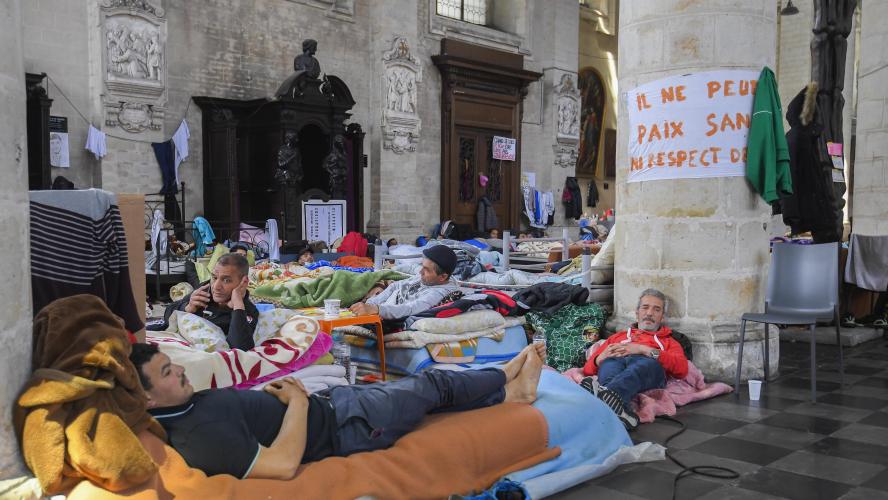Of the 516 undocumented migrants who went on hunger strike in the Beguinage church in the centre of Brussels last year in a bid to get collective regularisation of their migration status, only 90 have received a positive verdict to legally stay in Belgium.
Nearly a year after the end of the hunger strike, which even saw some participants sewing their mouths shut, the cases of all participants have been handled.
After the action, 442 applications for regularisation were submitted, concerning 516 persons. This resulted in 55 positive decisions, representing 90 persons, show figures from the cabinet of State Secretary for Asylum and Migration Sammy Mahdi, requested by De Morgen.
In practice, this means that just over one in six people received a residence permit.
"The Immigration Department has thoroughly studied all the files, some of them up to 300 pages thick," Mahdi told the newspaper. "I hope this will allow us to bring the discussion to a close. We continue to work on a correct policy. For many, this means returning to their country of origin."
Regularising a 'significant part' of the strikers
423 others were not granted permits, two applications were without object and one is still waiting for a decision. Just one person was regularised for medical reasons, after a doctor had established that no treatment is possible in the country of origin. The majority of the 516 applicants were people originally from Morocco (379), Algeria (88) and Pakistan (16).
Those who received a negative decision will receive guidance from a 'return counsellor' of the Immigration Department's return office ICAM. "There, all sustainable future perspectives for the person in question are explained," said Mahdi. Previously, he had already stated that the former hunger strikers would not get any special treatment.
On 21 July 2021, the action came to an end after more than 60 days of striking, when the strikers and Mahdi, alongside Immigration Department Director-General Freddy Roosemont and a special envoy, Dirk Van den Bulck, came to a verbal agreement about "concrete elements" that should make it possible to regularise a “significant part” of the hunger strikers.
Related News
- 'We were deceived': Hunger strikers accuse government of betrayal
- No special treatment for hunger strikers, says asylum secretary
- Migration Minister defends quick processing of undocumented migrant files 'to avoid hunger strike'
According to the representatives of the hunger strikers, they were told during this meeting that there was an option for regularisation for hunger strikers who "have been living in Belgium for a number of years and can produce proof of being well integrated."
However, the representatives have since argued that Mahdi did not stick to his word, that the discussions had "not been respected," and that the strikers had been "deceived" in what their lawyer called "an unprecedented betrayal."
Now, a spokesperson for the former hunger strikers speaks of a "Kafkaesque" situation. "During the 21 July agreement, clear guidelines were given, but from the answers of the Immigration Department it appears that no account was taken of the anchoring elements in Belgian society during the regularisation examinations."
"For example, the duration of the procedure, the length of stay in Belgium, family ties, or education and employment," they told De Morgen. "None of these positive elements was weighed in the balance."

